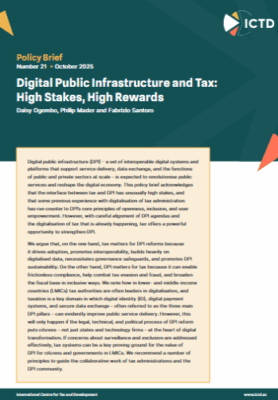Policy Brief 21
Digital public infrastructure (DPI) – a set of interoperable digital systems and platforms that support service delivery, data exchange, and the functions of public and private sectors at scale – is expected to revolutionise public services and reshape the digital economy. This policy brief acknowledges that the interface between tax and DPI has unusually high stakes, and that some previous experience with digitalisation of tax administration has run counter to DPI’s core principles of openness, inclusion, and user empowerment. However, with careful alignment of DPI agendas and the digitalisation of tax that is already happening, tax offers a powerful opportunity to strengthen DPI.
We argue that, on the one hand, tax matters for DPI reforms because it drives adoption, promotes interoperability, builds heavily on digitalised data, necessitates governance safeguards, and promotes DPI sustainability. On the other hand, DPI matters for tax because it can enable frictionless compliance, help combat tax evasion and fraud, and broaden the fiscal base in inclusive ways. We note how in lower- and middle-income countries (LMICs) tax authorities are often leaders in digitalisation, and taxation is a key domain in which digital identity (ID), digital payment systems, and secure data exchange – often referred to as the three main DPI pillars – can evidently improve public service delivery. However, this will only happen if the legal, technical, and political process of DPI reform puts citizens – not just states and technology firms – at the heart of digital transformation. If concerns about surveillance and exclusion are addressed effectively, tax systems can be a key proving ground for the value of DPI for citizens and governments in LMICs. We recommend a number of principles to guide the collaborative work of tax administrations and the DPI community.
